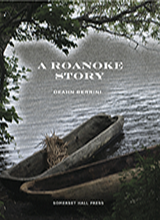Deahn Berrini - A Roanoke Story. Praise from the from the Jewish Journal
(Jewish Journal, November 2, 2017.)
NOVEMBER 2, 2017 – SWAMPSCOTT, MA – About five years ago, Deahn Berrini and her family were enjoying dinner at their Swampscott home. Her son, knowing of her interest in Native American people, mentioned that researchers had just discovered a clue to the lost colony of Roanoke Island, off the coast of North Carolina. “I said, ‘That could be a good story.’ And then my son said, ‘Hey, mom. You could write that,”’ said Berrini, the daughter of an Air Force father, who was born in Wiesbaden, Germany. A member of Temple Emanu-El in Marblehead, she grew up in Ipswich and attended Brown University, where she majored in history, and Boston College Law School. When her son brought it up, she found herself drawn to that unsolved puzzle of the mysterious disappearance of 115 British men, women, and children in 1587. Once she started her research, she knew she wanted to write the story, but not from the colonists’ point of view.
Some have speculated that Native Americans attacked and killed the English colonists. Others theorize they tried to return to England and were lost at sea, or might have been killed by Spaniards who came north from Florida. One theory suggests the settlers were absorbed into friendly Native American tribes.
When Berrini approached the story from the point of view of the people who were already there – the Croatoan Native American tribe – her heart and her imagination followed. “The characters came to me fully formed,” she said.
“When we think of the story we’re taught in middle school, it’s from the white British point of view. We’re never taught to think about the native peoples who were living there before the Europeans arrived. It was a thriving place up and down the eastern seaboard. We have very little consciousness of that.”
Four years and three rewrites later, Berrini hopes to change that with the publication of her third historical novel, “A Roanoke Story,” on Nov. 30. She will launch her book tour by reading from and discussing the book at the Swampscott Public Library from 7 to 9 p.m. on Monday, Nov. 13.
In addition to broadening our understanding of history, Berrini also sees a clear connection between “A Roanoke Story” and the abiding Jewish tenet of social justice. As head of Temple Emanu-El’s social action committee for the past five years, she has championed shedding light on unfairness and untruths.
“A lot about our country’s origins has been mythologized to make it easier to swallow,” she said. “I hope readers will look at the colonization of this country with a greater sense of the people whose land we invaded. Telling the story from the point of view of the marginalized people, that’s the social justice component.”

